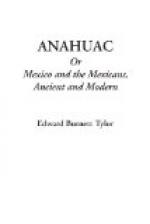The railway which took us from Havana to Batabano had some striking peculiarities. For a part of the way the track passed between two walls of tropical jungle. The Indian fig trees sent down from every branch suckers, like smooth strings, which rooted themselves in the ground to draw up more water. Acacias and mimosas, the seiba and the mahagua, with other hard-wood trees innumerable, crowded close to one another; while epiphytes perched on every branch, and creepers bound the whole forest into a compact mass of vegetation, through which no bird could fly. We could catch the strings of convolvulus with our walking-sticks, as the train passed through the jungle. Sometimes we came upon a swamp, where clusters of bamboos were growing, crowned with tufts of pointed leaves; or had a glimpse for a moment of a group of royal palms upon the rising ground.
We passed sugar-plantations with their wide cane-fields, the sugar-houses with tall chimneys, and the balconied house of the administrador, keeping a sharp look out over the village of negro-cabins, arranged in double lines.
In the houses near the stations where we stopped, cigar-making seemed to be the universal occupation. Men, women, and children were sitting round tables hard at work. It made us laugh to see the black men rolling up cigars upon the hollow of their thighs, which nature has fashioned into a curve exactly suited to this process.
At Batabano the steamer was waiting at the pier, and our passports and ourselves were carefully examined by the captain, for Cuba is the paradise of passport offices, and one cannot stir without a visa. For once everybody was en regle, and we had no such scene as my companion had witnessed a few days before.
If you are a married man resident in Cuba, you cannot get a passport to go to the next town without your wife’s permission in writing. Now it so happened that a respectable brazier, who lived at Santiago de Cuba, wanted to go to Trinidad. His wife would not consent; so he either got her signature by stratagem, or, what is more likely, gave somebody something to get him a passport under false pretences.
At any rate he was safe on board the steamer, when a middle-aged female, well dressed, but evidently arrayed in haste, and with a face crimson with hard running, came panting down to the steamer, and rushed on board. Seizing upon the captain, she pointed out her husband, who had taken refuge behind the other passengers at a respectful distance; she declared that she had never consented to his going away, and demanded that his body should be instantly delivered up to her. The husband was appealed to, but preferred staying where he was. The captain produced the passport, perfectly en regle, and the lady made a rush at the document, which was torn in half in the scuffle. All other means failing, she made a sudden dash at her husband, probably intending to carry him off by main force. He ran for his life,




